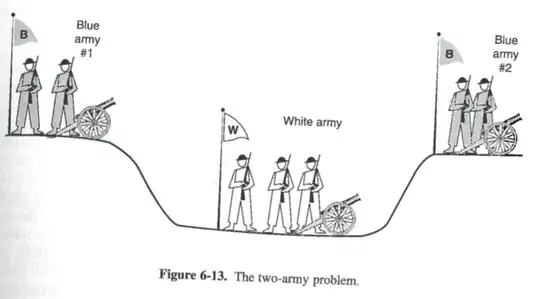There are multiple problems with this approach.
a) In your scenario we have two systems A and B and a maximally entangled state shared by them. Now B is send to the right and measured. But in any case, we can have two outcomes: Either B is spin up or B is spin down. You can only know that it is spin down if it was spin down beforehand. But then, A doesn't know anything they didn't know before.
In different words: Entanglement is only correlations. If I know my systems are correlated, I can predict part of the system knowing something about the other part, but if I change one part of the system in any way, I'll just destroy the correlation.
b) The entangled particles are sent before the battle. Now there is no reason to suppose they didn't get intercepted by the white army. Since A cannot know anything that B did (or did not do) to its part of the system, it cannot know whether the other party is not actually the white army instead of the blue.
c) There is never a backchannel. B never sends any signal to A. But then, A cannot know about anything that happened to B, because that would violate relativity. In order to send information, you have to send a signal with at most the speed of light (that's really the first problem from a different perspective).
But could entanglement help in any way with that dilemma?
You have two problems to worry about:
- Authentication of the recipient. You want to make sure that the other party is who they claim to be.
- Knowing that the party received the signal.
That directly implies that the other party needs to be able to respond to you - if they can't, you can't know that they received their signal, because you'd get information without signals, which violates physics.
If there is no way for blue to respond, nothing will help.
How could entanglement help? Well, it could potentially help with the first problem (authentication), but you can also do it by classical means.
Now there are two scenarios worth talking about:
- Let's assume the entangled particles were distributed before the two parts of the armies split. In that case, you could use any (insecure) line of communication to establish a secure, i.e. encrypted, line of communication using the entangled particles (one pair won't be enough, though). Once you have a secure line of communication, you could just send the signal, wait for a response reading the signal back to you and then you can be sure that the other party received the signal.
- Now let's assume that entanglement is not distributed in advance. In that case, it won't help, because you can't know that it isn't white who caught the other parts of the entangled particles. You'd then have to establish that it was really blue who received the particles by some other means. But that's the same as establishing authenticity of your communication partner over an insecure channel - something that can be achieved by classical means, also (have a look at e.g. four-factor authentication). Just as an example, I could ask a few questions whose answer only blue knows and send the signal and blue would respond that they received the signal and also tell you the answers to your questions.
